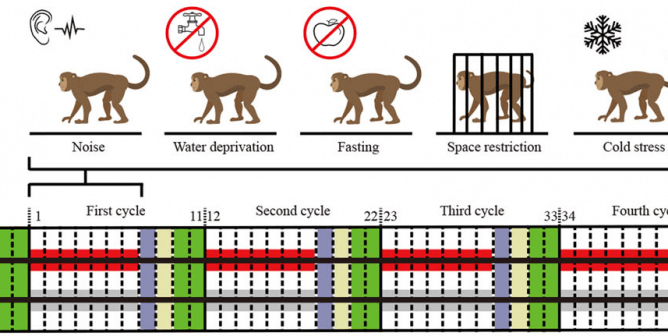Wake Forest U. Skirting U.S. Research Rules for Monkey Torture in China?
An experimenter at Wake Forest University (WFU) appears to be funneling your tax dollars to China in order to conduct obscenely unethical experiments on monkeys that amount to outright animal torture, CIA black site–style—and the school appears to be in violation of U.S. Public Health Service requirements.
What We Know
A paper, co-authored by Carol A. Shively of the Department of Pathology at the Wake Forest School of Medicine and published in January, describes experiments conducted at Chongqing Medical University in China that are so extreme that they likely would never be allowed to take place in the U.S. The paper reports that the experiments, designed to induce depression in adolescent macaques, were in part bankrolled by a taxpayer-funded National Institutes of Health (NIH) grant, even though the Chinese school isn’t authorized to receive NIH money.
Torture, Plain and Simple
Lab workers caged the macaques alone for 80 days. For 55 continuous days, experimenters blasted them with a 100-decibel sound—roughly the volume of a jackhammer—for 12 consecutive hours. They deprived the animals of water or any other fluids for 12 hours at a time and of food for 24 hours. They put the monkeys in cages barely bigger than their bodies, severely restricting their movement for four hours; sprayed them with cold (50-degree) water for 10 minutes; forced them to endure a strobe light for 12 hours; and subjected them to inescapable and repeated electric shocks on their feet for up to 90 seconds.
Food and water deprivation, movement restriction, sonic and cold-water blasts, and electric shocks—by any standard, this is torture. This behavior toward humans is banned by international law and punishable by strict penalties. The authors also subjected the monkeys to the human-intruder test, a wildly cruel experiment developed by notorious monkey tormenter Ned Kalin, to “elicit anxiety-like behaviors.”

At the end of the torture, the monkeys exhibited signs of depression, such as assuming a “huddle posture” by clasping themselves with their heads at or below the shoulders while awake. They spent less time moving and were disinterested in items, such as apples, that they had previously enjoyed.
Ethics Dumping as a ‘Promising Model’
These egregious experiments appear to be a case of “ethics dumping,” or outsourcing experiments to a country with lax ethical and legal protections. Possibly the most disturbing aspect of this case is that these grotesque experiments have been proposed as a “paradigm” to create “a promising model” to study depression. Shively and others are actually encouraging others to repeat the torture outlined in the paper as a starting point from which to carry out additional experiments on these suffering animals.
Garbage Science
Sexual and physical abuse, substance-use disorders, interpersonal relationship problems, economic stress, and chronic illness or injury are more common life traumas associated with mental illness in humans. Blasting monkeys with water cannons, bombarding them with jackhammer-like sounds, and blinding them with strobe lights are not the same thing by a long shot. Add that to the fundamental differences in gene expression, brain anatomy, physiology, and development among humans and other primates, and you have experiments that are doomed to fail from the start.

Who’s Minding the Store?
WFU has a panel charged with overseeing animal experiments called the Institutional Animal Care & Use Committee (IACUC). However, its stamp of approval is curiously missing from the published paper. This is problematic.
If the IACUC did actually review and approve these experiments, it suggests that the committee is incapable of doing its job and implicates it in an obvious case of ethics dumping. If the panel knew that Shively used some of her NIH grant money to bankroll the experiments but didn’t review or approve them, it also suggests that it can’t uphold its legally mandated responsibilities. Either way, WFU’s IACUC has some explaining to do.
Stop Monkey Torment, Here and Abroad
PETA has filed a complaint with NIH and demanded that Wake Forest launch an immediate and thorough investigation into the possible misappropriation of NIH money and the possible failure of the school’s IACUC.
You don’t have to go all the way to China to find NIH-funded monkey horrors. Elisabeth Murray’s monkey fright fest—egregiously awful experiments in which experimenters inflict permanent and debilitating brain damage on monkeys, deprive them of food and water, restrain them for extended periods, and lock them inside darkened cages, where they’re deliberately frightened with fake spiders and snakes—take place right here in an NIH laboratory in Bethesda, Maryland.

